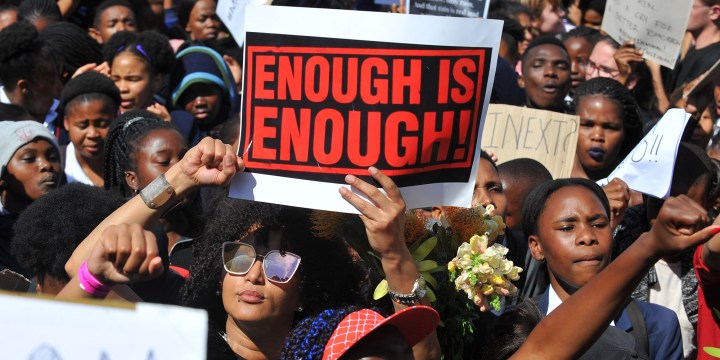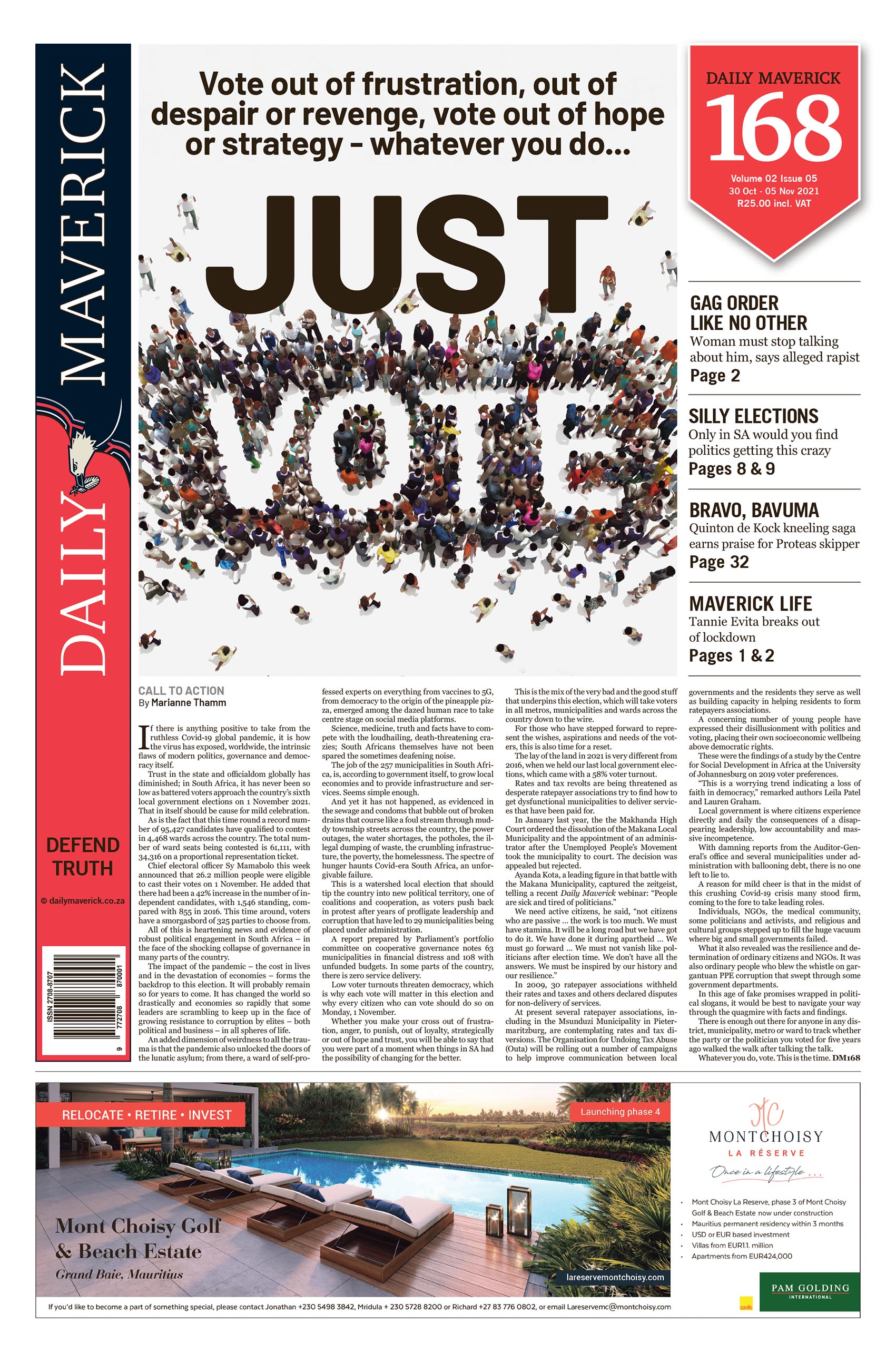GENDER-BASED VIOLENCE
Silence is dangerous: Gagging survivors of alleged rape will have a ripple effect, Cape High Court told

A gag order to stop a woman from speaking about her alleged rapist would have a chilling effect throughout South Africa, the Cape High Court was told in an attempt to overturn the order.
The Western Cape High Court has been asked to overturn a gag order issued against a Cape Town woman, barring her from talking about her alleged rape.
Although she has never spoken about the alleged rape in public or openly on a social media platform, she had apparently shared details of her alleged attack and her alleged attacker with other rape survivors. These private messages were made public by another person.
The man who allegedly raped her is involved in the Cape Town fashion industry and has possibly been involved in more than one attack on women.
He opposed the woman’s appeal on the basis that she had harassed him and had caused him harm by posting on social media and telling others that he had raped her.
“Interdicts such as the one sought by [this man] are absolute gagging orders. This compounds the silencing of rape survivors’ experience. It is not only disproportionate to the harm claimed by [the man].
“It has the danger of having a ripple effect throughout South Africa, causing women to remain silent about rape, and leading to a regression in the fight against gender-based violence,” said Bonita Meyersfeld, counsel for the rape survivor, before the Western Cape High Court. She said the man had never denied that he had raped the woman.
The Women’s Legal Centre was supported by the Centre for Applied Legal Studies and the Wise Collective in their legal action.
“She is trying to be heard and to find healing. Survivors of gender-based violence are not dabbling in hostile gossip – they are acting in the interests of the advancement of their own rights and that of the public interest.
“Survivors are silenced by their families, by their communities, by social stigmas and by the criminal justice system. In the matter before this court, a victim of one of the most egregious forms of gender-based violence is once again being silenced. This time, she is silenced by the courts,” Meyersfeld said.
The “chilling effect” of the order would spread throughout the country, compounding the vulnerability of all women.
“In a society where a quarter to a third of women is or will be a victim of gender-based violence, silence is dangerous,” she said. “The more we are able to speak openly, provide support and address impunity, the greater the chance of reducing gender-based violence in South Africa.”
The order to prevent the woman from talking about her alleged rape was issued by the Cape Town Regional Court in November last year. But, Meyersfeld argued, the order “is wrong in law and, in fact, it also constitutes a regression in the national fight against gender-based violence. [It] stands to be overruled both because it is erroneous and also because of its impact on millions of women in South Africa.”
The two people were in a romantic relationship between 2012 and 2015.
According to papers before court, there are claims that the man had abused the woman, both emotionally and mentally. His outbursts were reportedly so severe that his mother had him admitted to a clinic.
After he was discharged, the woman ended the relationship. It is alleged that the rape took place after she ended the relationship.
The woman was then advised by a social worker not to report her alleged rape but rather to take measures to protect herself from continuing abuse.
She then applied for a protection order under the Domestic Violence Act.
Her former partner applied for his own protection order. The respective applications were settled after the woman agreed to withdraw her application.
She began telling people about what happened and, according to papers before court, her intention was to create a community with other victims of rape as a form of healing for herself.
She also posted on social media about the crisis of sexual violence in general and in the fashion industry specifically, but never identified her rapist.
She only identified him in a private WhatsApp group, where survivors of rape discussed their experiences. But someone made her messages on the WhatsApp group public, in violation of the group rules.
“The publication of the details of her rape without her permission was devastating to her. She felt that the posting without her consent was similar to … rape,” Meyersfeld said. After the messages were made public, the man approached the Cape Town Magistrates’ Court for an urgent protection order in terms of the Domestic Violence Act.
He claimed that his former girlfriend made allegations that he had raped or sexually abused her whenever his business received good publicity, and that she had enlisted the help of others to harass him and spread the word that he had raped or sexually assaulted them.
The court handed down a final protection order in favour of the man on 26 November last year, prohibiting the woman from “engaging in or attempting to engage in the harassment of him” and disclosing “to anyone in any manner that the man had allegedly raped her”.
The court found that the man was a victim of cyberbullying and this had caused him emotional distress and anguish.
The court found that saying someone had raped her was a serious allegation and justified the limitation on the constitutional rights of the survivor.
The implications of this finding are staggering. It means, in essence, that women who survive rape must not tell others about it. They must not talk to anyone about it, for fear that if someone else relays their story and the identity of the abuser is revealed, they will be sued in court. And indeed, this is exactly what [this order] has done.
Meyersfeld said there had been no contact between the two people since 2017. The woman had also never publicly named her rapist and was not the author of the posts where he was outed as her rapist.
In her testimony before the Cape Town regional court, the woman said she was angry and hurt that someone else had used her story without her permission and spoke about feeling violated anew by the posts.
“[She] is not a puppet master engineering the downfall of [the man]. She is one of millions of South African women who have been raped and violated and who is trying to find healing and wellness, safety and community,” Meyersfeld said.
“It is not unreasonable for a victim of rape to tell her friends and a private support group online that she has been raped and by whom. It is not unreasonable to push back against a culture of gender-based violence that the President of South Africa has compared to a scourge as deadly and widespread as Covid-19.”
She added that it appeared that the magistrate had lost sight of the fact that the woman had also been abused by the man and had first sought to protect herself against harassing communication.
“She was abused, raped and violated by [him]. He has never denied that he had raped her,” she added. Others had also alleged that he raped them.
“There has been an appropriation of victimhood by [the man] that does violence to the principles and purpose of the [domestic violence legislation] and to the fight against gender-based violence in South Africa.
“The implications of this finding are staggering. It means, in essence, that women who survive rape must not tell others about it. They must not talk to anyone about it, for fear that if someone else relays their story and the identity of the abuser is revealed, they will be sued in court. And indeed, this is exactly what [this order] has done.
“It has gagged the [rape survivor].”
Advocate Letlhogonolo Mokgoroane, arguing on behalf of the Centre for Applied Legal Studies, reminded judges Robert Henney and Daniel Thulare that it is an “astounding proposition that the alleged rapist should have editorial rights over the alleged victim’s narrative”.
“This is really the crux of this case. The [man] is seeking to silence the [rape survivor] by (mis)using the court process. This matter raises significant questions of freedom of expression in the context of sexual offences and gender-based violence.
“If this court confirms the finding, it will send an unmistakable message to the whole of society that the daily trauma of vast numbers of women counts for little.
“The court must employ a gender-sensitive approach to understand the level of pain and suffering experienced by women. In doing so, the court gives effect to the protections afforded to women under international law as well as national law.”
Womxn’s Legal Centre attorney Chriscy Blouws said that they recognised that survivors who publicly speak about their sexual abuse did so in an attempt to break the silence and stigma surrounding rape.
“They do so to create a sense of community, empowerment and solidarity among other survivors and to challenge rape culture, which for years has treated women with suspicion and perpetrators with impunity.
“We hope that the courts in making [their] determination in these types of matters do so by applying a gendered lens to the facts of these cases, in particular when balancing the rights of both the survivor and perpetrator,” Blouws said.
Sheena Swemmer, the head of the Gender Justice Programme at the Centre for Applied Legal Studies, said the right to freedom of expression included the right of women to speak openly about their experiences of gender-based violence.
“The state and the courts have a duty to promote that right, instead of allowing a law designed to protect victims and survivors to be used to silence them.” DM168
This story first appeared in our weekly Daily Maverick 168 newspaper which is available for R25 at Pick n Pay, Exclusive Books and airport bookstores. For your nearest stockist, please click here.



















 Become an Insider
Become an Insider
Why aren’t the rape allegations being investigated with a view to prosecution? It is an alarming situation and quite terrifying that rapists can use the courts to silence their victims.